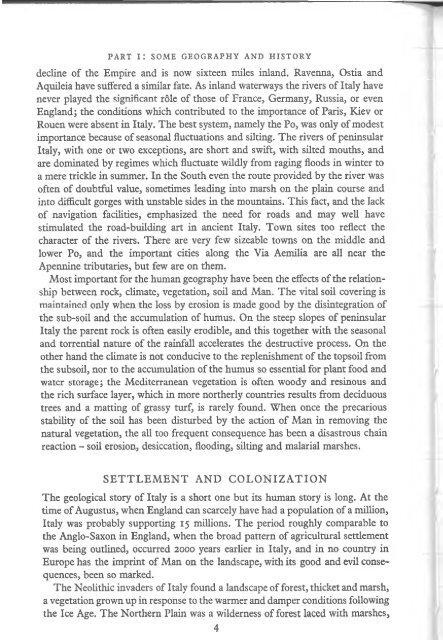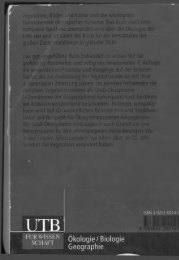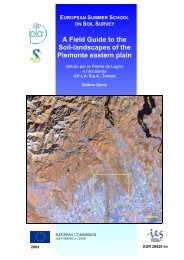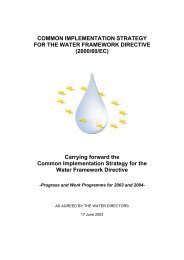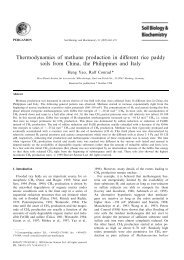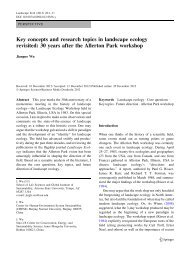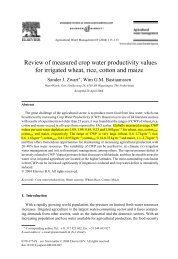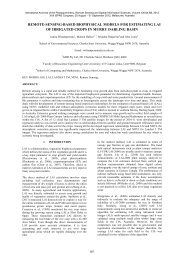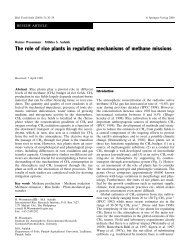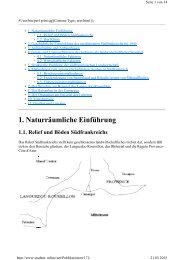Walker - 1967 - A geography of Italy
Walker - 1967 - A geography of Italy
Walker - 1967 - A geography of Italy
You also want an ePaper? Increase the reach of your titles
YUMPU automatically turns print PDFs into web optimized ePapers that Google loves.
PART i: SOME GEOGRAPHY AND HISTORY<br />
decline o f the Empire and is now sixteen miles inland. Ravenna, Ostia and<br />
Aquileia have suffered a similar fate. As inland waterways the rivers o f <strong>Italy</strong> have<br />
never played the significant rôle o f those o f France, Germany, Russia, or even<br />
England; the conditions which contributed to the importance o f Paris, K iev or<br />
Rouen were absent in <strong>Italy</strong>. The best system, namely the Po, was only o f modest<br />
importance because o f seasonal fluctuations and silting. The rivers o f peninsular<br />
<strong>Italy</strong>, with one or two exceptions, are short and swift, with silted mouths, and<br />
are dominated by regimes which fluctuate wildly from raging floods in winter to<br />
a mere trickle in summer. In the South even the route provided by the river was<br />
<strong>of</strong>ten o f doubtful value, sometimes leading into marsh on the plain course and<br />
into difficult gorges with unstable sides in the mountains. This fact, and the lack<br />
o f navigation facilities, emphasized the need for roads and may well have<br />
stimulated the road-building art in ancient <strong>Italy</strong>. Tow n sites too reflect the<br />
character o f the rivers. There are very few sizeable towns on the middle and<br />
lower Po, and the important cities along the Via Aemilia are all near the<br />
Apennine tributaries, but few are on them.<br />
Most important for the human <strong>geography</strong> have been the effects o f the relationship<br />
between rock, climate, vegetation, soil and Man. The vital soil covering is<br />
maintained only when the loss by erosion is made good by the disintegration <strong>of</strong><br />
the sub-soil and the accumulation o f hiunus. On the steep slopes o f peninsular<br />
<strong>Italy</strong> the parent rock is <strong>of</strong>ten easily erodible, and this together with the seasonal<br />
and torrential natme o f the rainfall accelerates the destructive process. On the<br />
other hand the climate is not conducive to the replenishment o f the topsoil from<br />
the subsoil, nor to the accumulation o f the humus so essential for plant food and<br />
water storage; the Mediterranean vegetation is <strong>of</strong>ten woody and resinous and<br />
the rich surface layer, which in more northerly countries results from deciduous<br />
trees and a matting <strong>of</strong> grassy turf, is rarely found. When once the precarious<br />
stabihty o f the soil has been disturbed by the action o f M an in removing the<br />
natural vegetation, the all too frequent consequence has been a disastrous chain<br />
reaction - soil erosion, desiccation, flooding, silting and malarial marshes.<br />
S E T T L E M E N T AND C O L O N IZ A T IO N<br />
The geological story o f <strong>Italy</strong> is a short one but its human story is long. A t the<br />
time o f Augustus, when England can scarcely have had a population o f a million,<br />
<strong>Italy</strong> was probably supporting 15 milhons. The period roughly comparable to<br />
the Anglo-Saxon in England, when the broad pattern o f agricultmral settlement<br />
was being outlined, occurred 2000 years earlier in <strong>Italy</strong>, and in no country in<br />
Europe has the imprint o f Man on the landscape, with its good and evil consequences,<br />
been so marked.<br />
The Neohthic invaders o f <strong>Italy</strong> found a landscape o f forest, thicket and marsh,<br />
a vegetation grown up in response to the warmer and damper conditions following<br />
the Ice Age. The Northern Plain was a wilderness o f forest laced with marshes,<br />
4


